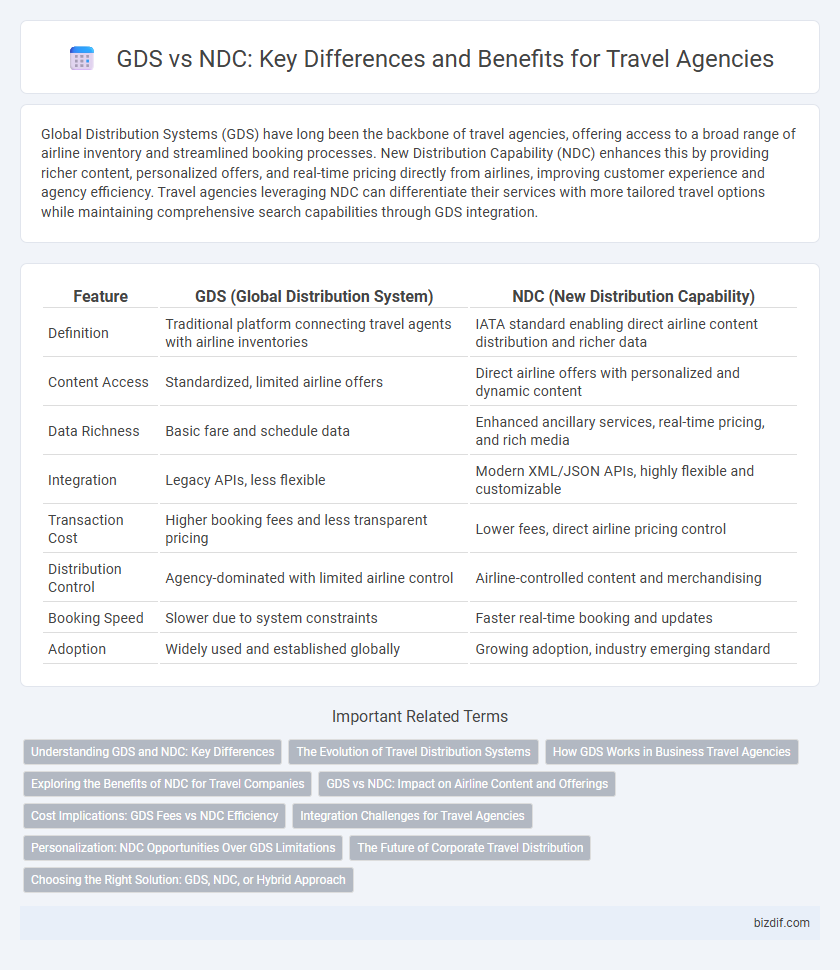Global Distribution Systems (GDS) have long been the backbone of travel agencies, offering access to a broad range of airline inventory and streamlined booking processes. New Distribution Capability (NDC) enhances this by providing richer content, personalized offers, and real-time pricing directly from airlines, improving customer experience and agency efficiency. Travel agencies leveraging NDC can differentiate their services with more tailored travel options while maintaining comprehensive search capabilities through GDS integration.
Table of Comparison
| Feature | GDS (Global Distribution System) | NDC (New Distribution Capability) |
|---|---|---|
| Definition | Traditional platform connecting travel agents with airline inventories | IATA standard enabling direct airline content distribution and richer data |
| Content Access | Standardized, limited airline offers | Direct airline offers with personalized and dynamic content |
| Data Richness | Basic fare and schedule data | Enhanced ancillary services, real-time pricing, and rich media |
| Integration | Legacy APIs, less flexible | Modern XML/JSON APIs, highly flexible and customizable |
| Transaction Cost | Higher booking fees and less transparent pricing | Lower fees, direct airline pricing control |
| Distribution Control | Agency-dominated with limited airline control | Airline-controlled content and merchandising |
| Booking Speed | Slower due to system constraints | Faster real-time booking and updates |
| Adoption | Widely used and established globally | Growing adoption, industry emerging standard |
Understanding GDS and NDC: Key Differences
Global Distribution Systems (GDS) aggregate airline, hotel, and car rental inventory, allowing travel agencies to book services through a centralized platform with standardized content. New Distribution Capability (NDC) is an XML-based data transmission standard developed by IATA that enables airlines to offer personalized, dynamic content and ancillary services directly to travel agents and customers. The key difference lies in GDS's reliance on traditional fare and inventory data versus NDC's ability to deliver rich, customized product offerings and real-time pricing, enhancing the booking experience and revenue opportunities.
The Evolution of Travel Distribution Systems
Travel distribution systems have evolved from traditional Global Distribution Systems (GDS) to New Distribution Capability (NDC) standards, enhancing airline content accessibility and personalization. NDC leverages XML-based data exchange to offer richer, dynamic product information directly from airlines, enabling travel agencies to deliver tailored booking experiences. This shift allows for real-time inventory updates and customized services, transforming the distribution landscape for travel agencies and airline partners worldwide.
How GDS Works in Business Travel Agencies
Global Distribution Systems (GDS) serve as centralized platforms connecting business travel agencies with airlines, hotels, and car rental services, enabling real-time access to inventory and pricing. By aggregating content from multiple suppliers, GDS facilitates seamless booking management, itinerary customization, and compliance with corporate travel policies. Business travel agencies rely on GDS platforms like Amadeus, Sabre, and Travelport to streamline reservations, ensuring efficient and cost-effective travel solutions for corporate clients.
Exploring the Benefits of NDC for Travel Companies
NDC (New Distribution Capability) enhances travel companies' access to rich, personalized content and dynamic pricing compared to traditional GDS (Global Distribution Systems). By leveraging XML-based messaging, NDC enables travel agencies to offer tailored packages and real-time updates, improving customer satisfaction and boosting revenue streams. Travel companies adopting NDC gain competitive advantages through increased transparency and direct airline communication.
GDS vs NDC: Impact on Airline Content and Offerings
Global Distribution Systems (GDS) provide extensive, standardized access to airline content, enabling travel agencies to book a wide range of flights and services efficiently. New Distribution Capability (NDC) enhances airline content by allowing carriers to offer personalized, dynamic pricing and ancillary services directly through travel agents, improving the customer experience. This shift from GDS to NDC impacts airline offerings by increasing customization, improving fare transparency, and enabling more direct control over inventory and promotions.
Cost Implications: GDS Fees vs NDC Efficiency
GDS fees typically involve higher costs due to transaction-based charges and intermediary commissions, impacting overall travel agency profitability. NDC streamlines content distribution by enabling direct supplier-to-agent communication, reducing reliance on costly intermediaries and minimizing transaction fees. This efficiency in NDC adoption leads to significant cost savings and improved margin retention for travel agencies managing airline bookings.
Integration Challenges for Travel Agencies
Travel agencies face significant integration challenges when transitioning from traditional Global Distribution Systems (GDS) to New Distribution Capability (NDC) APIs due to disparate data formats and limited standardization. The complexity of aligning NDC content with existing GDS infrastructure often results in increased development time and higher IT costs. Effective integration requires robust middleware solutions and continuous updates to manage dynamic airline offerings and maintain seamless booking experiences.
Personalization: NDC Opportunities Over GDS Limitations
NDC (New Distribution Capability) enables travel agencies to offer highly personalized travel options by accessing detailed airline content and dynamic pricing, surpassing the static, limited data available through traditional GDS (Global Distribution Systems). This enhanced personalization allows agencies to tailor itineraries based on passenger preferences, loyalty status, and ancillary services, improving customer satisfaction and upsell opportunities. By leveraging NDC, travel agencies can deliver a more customized booking experience that GDS platforms struggle to match due to their standardized, less flexible distribution model.
The Future of Corporate Travel Distribution
The future of corporate travel distribution is shifting towards NDC (New Distribution Capability) as it offers richer, more personalized content compared to traditional GDS (Global Distribution Systems). NDC enables travel agencies to access real-time data, tailored offers, and ancillaries directly from airlines, enhancing the booking experience and operational efficiency. By adopting NDC, corporate travel programs gain greater transparency, flexibility, and cost-efficiency in managing travel policies and supplier relationships.
Choosing the Right Solution: GDS, NDC, or Hybrid Approach
Choosing the right travel booking solution involves evaluating GDS, NDC, or a hybrid approach based on distribution needs and technological integration. GDS offers extensive global inventory and established connectivity, while NDC enhances personalized offers and rich content through direct airline communication. A hybrid approach combines the broad reach of GDS with the dynamic capabilities of NDC, optimizing inventory access and customer experience for travel agencies.
GDS vs NDC Infographic

 bizdif.com
bizdif.com